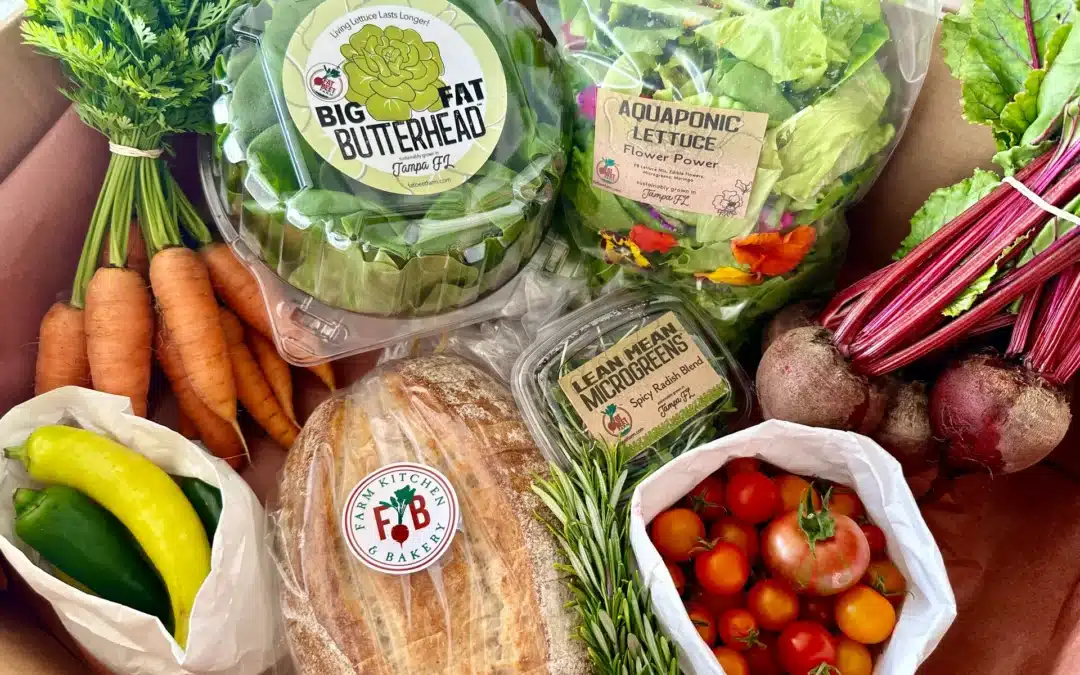You walk into another big chain supermarket, grab a plastic-wrapped tomato that traveled 1,500 miles to reach your cart, and wonder why it tastes like cardboard. Sound familiar?
Here’s what we’ve discovered: when you know where to find fresh groceries Tampa farmers grow locally, you’ll never settle for bland, overpriced produce again. We’re about to show you exactly how to find the freshest, most flavorful groceries in Tampa while supporting local farmers and saving money. Plus, we’ll reveal the secret spots where Tampa families are already shopping smarter.
Why Choose Local Produce Tampa Has to Offer?
When you shop for local produce Tampa farmers grow, you’re making a decision that ripples through the entire community. Local produce travels shorter distances from farm to table, meaning it retains nutrients and arrives at peak freshness. Unlike produce that travels thousands of miles and sits in warehouses for weeks, locally grown fruits and vegetables can be harvested at optimal ripeness and reach your plate within days.
The nutritional benefits are substantial. Studies consistently show that locally sourced produce contains higher levels of vitamins, minerals, and antioxidants compared to their long-distance counterparts. When you bite into a tomato grown in nearby Hillsborough County soil, you’re experiencing the full flavor profile that nature intended, not the watered-down taste of produce picked green and artificially ripened during transport.
Supporting Tampa’s Agricultural Community
Every dollar spent on locally sourced groceries directly supports Tampa Bay area farmers and agricultural workers. These hardworking individuals face increasing pressure from industrial agriculture and urban development, making community support crucial. When you choose local, you’re helping preserve farmland, maintain agricultural diversity, and ensure that future generations can enjoy fresh, locally grown food.
Local farmers also employ sustainable growing practices that benefit the environment. Many Tampa area producers use organic or low-impact farming methods that protect soil health, conserve water, and reduce chemical runoff into our waterways. This commitment to environmental stewardship makes locally sourced groceries an excellent choice for eco-conscious shoppers.
The Rise of Tampa Farm-to-Table Movement
The Tampa farm-to-table movement has gained tremendous momentum, with restaurants and grocery stores forming direct partnerships with local producers. This approach eliminates multiple middlemen, ensuring farmers receive fair compensation while consumers access the freshest possible ingredients at competitive prices.
Farm-to-table has evolved beyond restaurants. Forward-thinking grocery stores are embracing this model by sourcing directly from local farms, creating seasonal displays, and educating customers about the origins of their food. This transparency allows shoppers to make informed decisions while building connections between urban consumers and rural producers.
How Tampa Grocery Stores Are Leading the Local Movement
Finding high-quality, locally sourced groceries in Tampa has never been easier. Progressive Tampa grocery stores throughout the area are expanding their local offerings, creating dedicated sections for regional produce, and partnering with nearby farms to ensure consistent availability of seasonal favorites.
These community-focused stores prioritize sourcing quality products while maintaining competitive prices, making them standout choices for families seeking fresh groceries Tampa residents love. Their extensive product selections include locally sourced options that support regional farmers while meeting the diverse needs of Tampa’s multicultural community.
Seasonal Shopping: Maximizing Freshness and Flavor
Understanding Tampa’s growing seasons helps maximize the benefits of locally sourced groceries. Florida’s unique climate allows for year-round production of many crops, giving Tampa residents access to fresh groceries Tampa weather makes possible, even during winter months when northern regions rely entirely on imports.
Spring brings an abundance of leafy greens, herbs, and early summer vegetables. Summer explodes with tomatoes, peppers, squash, and tropical fruits. Fall offers sweet potatoes, winter squash, and late-season tomatoes, while winter provides citrus fruits, root vegetables, and cool-season greens. Shopping seasonally not only ensures peak flavor and nutrition but also supports natural growing cycles and reduces environmental impact.
Making the Transition to Local Shopping
Transitioning to locally sourced groceries doesn’t require a complete lifestyle overhaul. Start by incorporating one or two local items into your weekly shopping routine. Try locally grown citrus instead of imported varieties, or swap out mass-produced herbs for fresh alternatives from nearby farms.
Many shoppers find that locally sourced groceries actually save money over time. While initial prices might seem higher, the superior quality means less food waste, longer shelf life for fresh items, and greater satisfaction with meals. The investment in local food is an investment in your health, your community, and your taste buds.
Planning Your Local Grocery Shopping Experience
Successful local grocery shopping requires slight adjustments to shopping habits. Seasonal availability means menus might need flexibility, but this encourages culinary creativity and ensures you’re always eating foods at their nutritional and flavor peak. Keep an open mind when exploring local options. You might discover new favorite foods grown right in your backyard.
Building relationships with local grocery staff can enhance your shopping experience. Many employees at community-focused stores are knowledgeable about sourcing, seasonal availability, and preparation tips for unfamiliar local varieties. Don’t hesitate to ask questions about origins, harvest dates, or cooking suggestions.
The Environmental Impact of Your Choices
Choosing locally sourced groceries significantly reduces your carbon footprint. Food transportation accounts for a substantial portion of grocery-related environmental impact, and local sourcing eliminates most of this burden. Additionally, local farms typically use fewer preservatives and packaging materials, further reducing environmental impact.
Water conservation is another benefit of local sourcing. Tampa area farmers understand regional water challenges and often employ efficient irrigation systems and drought-resistant varieties. Supporting these practices encourages continued innovation in sustainable agriculture.
Tampa Grocery Stores Building Community Through Food Choices
Food has always been a cornerstone of community building, and locally sourced groceries strengthen these connections. When you purchase from Tampa grocery stores committed to local sourcing, you’re participating in an economic ecosystem that keeps dollars circulating within the Tampa Bay area, supporting job creation and community development.
Many community-focused grocery stores go beyond simple retail to become neighborhood gathering places. They often host events, support local causes, and create spaces where residents can connect over shared values of quality, affordability, and community support.
Your Next Steps Toward Local Grocery Shopping
Ready to embrace locally sourced groceries? Start by exploring stores in your neighborhood that prioritize local partnerships and community connections. Look for seasonal displays, ask about sourcing practices, and don’t be afraid to try something new.
For Tampa residents seeking a grocery store that combines local sourcing with community values and competitive prices, consider visiting Key Food Tampa. Their commitment to quality products and customer service makes them an excellent starting point for your locally sourced grocery journey. You can explore their extensive product selection or get in touch to discuss specific local products you’re seeking.
The movement toward locally sourced groceries represents a choice to invest in your health, support your community, and contribute to a sustainable food system. Every locally grown tomato, every bunch of Florida herbs, and every decision to shop locally helps build a stronger, connected Tampa Bay community.
Start small, think seasonal, and prepare to discover the incredible flavors that grow right here in Tampa’s backyard. Your taste buds, your wallet, and your community will thank you.
Frequently Asked Questions
What makes locally sourced groceries better than regular supermarket produce?
Locally sourced groceries are harvested at peak ripeness and travel shorter distances, meaning they retain more nutrients and flavor. They also support local farmers and reduce environmental impact from transportation.
Are locally sourced groceries more expensive?
While some local items may have higher upfront costs, they often provide better value through superior quality, longer shelf life, and less food waste. Many shoppers find they save money overall.
Where can I find fresh groceries Tampa farmers grow locally?
Look for Tampa grocery stores that prioritize local partnerships, farmers markets, and stores with dedicated local produce sections. Many community-focused supermarkets now source directly from regional farms.
What local produce is available year-round in Tampa?
Thanks to Florida’s climate, Tampa enjoys year-round availability of citrus fruits, leafy greens, herbs, and many vegetables. Seasonal specialties include summer tomatoes, fall squash, and winter root vegetables.
How do I know if produce is actually locally grown?
Ask store staff about sourcing, look for signs indicating farm origins, and check for labels mentioning Florida or local county names. Reputable stores are transparent about their local partnerships.
What’s the difference between local produce Tampa offers and organic produce?
Local refers to geographic proximity, while organic refers to growing methods without synthetic pesticides or fertilizers. Many local Tampa farms use organic or sustainable practices, offering the best of both worlds.
How can I support the Tampa farm-to-table movement?
Shop at stores that partner with local farms, ask questions about produce origins, try seasonal items, and choose locally grown options when available. Every purchase supports local agriculture.
Which Tampa grocery stores have the best selection of local produce?
Look for stores that emphasize community connections, have knowledgeable staff about sourcing, and maintain relationships with local farmers. Community-focused supermarkets often lead in local offerings.
How long does locally sourced produce stay fresh compared to imported produce?
Locally sourced produce typically stays fresh 3-5 days longer than imported alternatives because it’s harvested closer to peak ripeness and doesn’t endure long transportation periods that stress the produce.
Can I find locally sourced groceries beyond just fruits and vegetables?
Absolutely! Tampa area farms produce local honey, fresh herbs, dairy products, eggs, and seasonal specialties. Many Tampa grocery stores also carry locally made products like artisanal breads, preserves, and specialty items from regional producers.


